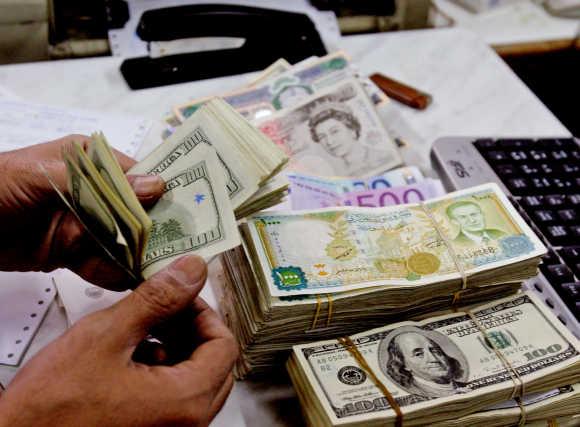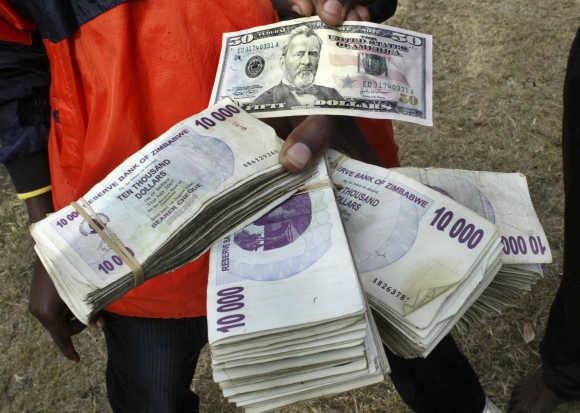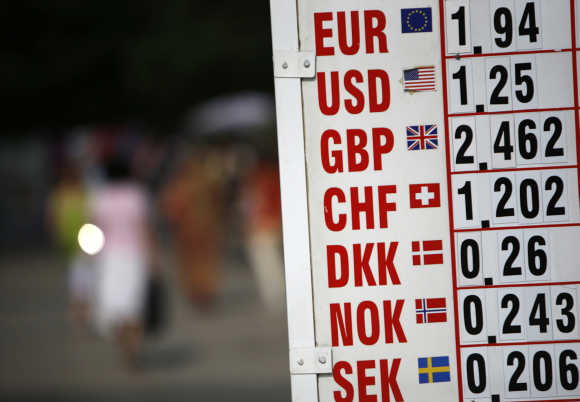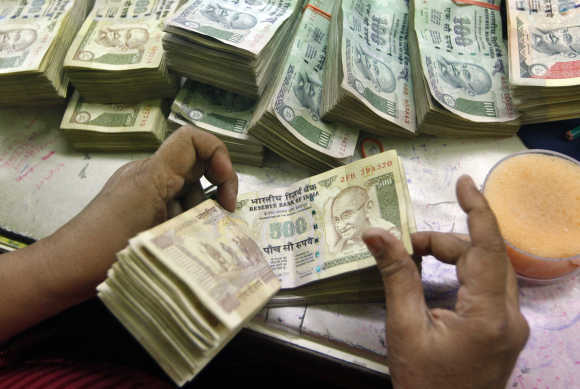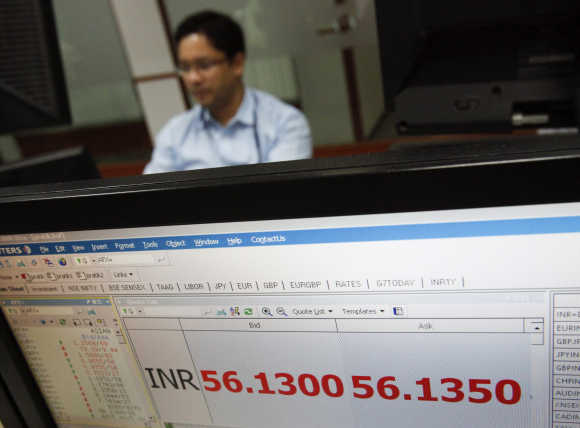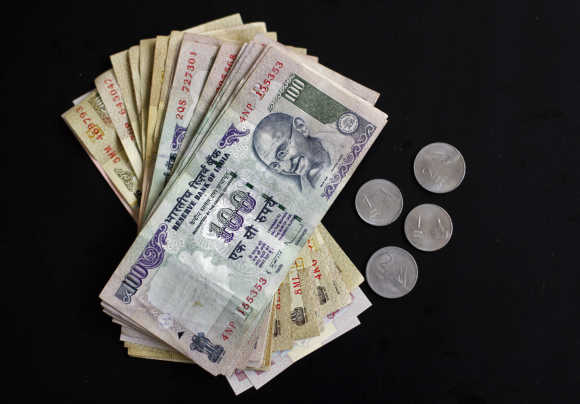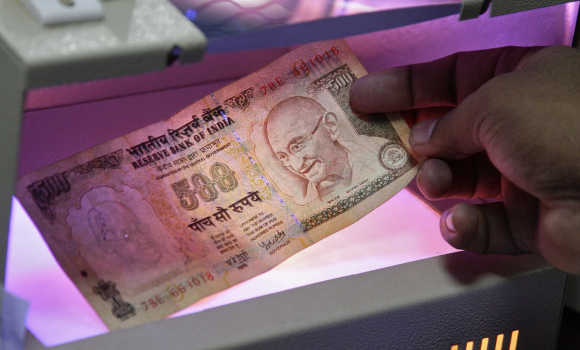 | « Back to article | Print this article |
Govt still hasn't recovered all the black money
In 2008, leaders of G20 countries gathered in Washington for the first summit on Financial Markets and the World Economy after the subprime crisis.
Two days of photo-ops and talks yielded a detailed resolution in which a key point was coordinated action on black money and cleaning up tax havens through which it is routed.
India being a member of the group was part of the whole exercise.
Four years later, what progress has India made? Yoga guru Baba Ramdev, who recently completed a six-day protest in the capital's Ramlila Maidan, may insist that the record on this score is blank, but he would be only slightly off the mark.
Click NEXT to read more...
Govt still hasn't recovered all the black money
The government has received Rs 200 crore (Rs 2 billion) of the Rs 600 crore (Rs 6 billion) it detected as tax evasion. This detection, however, was based on information the Indian tax authorities received from Germany and France as a result of information-sharing agreements.
One concerned 17 accounts from LGT Bank located in tax haven Liechtenstein on which Germany provided information in 2010. The other came from France, which provided information on 700 bank accounts in HSBC Bank last year.
To be sure, receiving and acting on information on black money is not the same as being proactive on the issue. Indeed, on the basic question of an official estimate of black money, the country is still in the dark.
Click NEXT to read more...
Govt still hasn't recovered all the black money
A detailed white paper on black money published by the finance ministry on May 12 examined several global estimates but dismissed them as inaccurate.
The government has now given the task of coming up with an estimate to three think tanks - National Institute of Public Finance and Policy, National Council of Applied Economic Research and National Institute of Financial Management. The report, originally scheduled for September, is expected by the end of this year.
But action on the ground counts for as much and India has been something of a conspicuous laggard on this account.
Consider the US track record. On June 26, the US Internal Revenue Service announced that its offshore voluntary disclosure programmes of 2009 and 2011 had so far resulted in the collection of more than $5 billion in back taxes, interest and penalties from 33,000 voluntary disclosures.
Click NEXT to read more...
Govt still hasn't recovered all the black money
A new programme in January yielded another 1,500 disclosures. Countries like Australia, Argentina, Canada and the UK have reported roughly similar progress.
In fact, Australia's Project Wickenby, started in 2006, is one of the biggest and most successful cross-agency initiatives among Commonwealth nations.
According to the Australian Taxation Office, Project Wickenby's success is demonstrated by nearly $1.3 billion it raised, as well as increased tax collections from improved compliance.
How did these countries achieve this? By either swiftly passing laws and/or setting up enforcement and detection agencies and systems for information-sharing and disclosure.
Click NEXT to read more...
Govt still hasn't recovered all the black money
For instance, in 2010, the US introduced a law called Foreign Account Tax Compliance Act. It aims to prevent US citizens from evading tax via offshore accounts. FATCA, thus, requires non-US banks to report accounts of US clients to the IRS.
The US tax authorities also plans to complement FATCA with the "Stop Tax Haven Abuse Act" that plugs specific offshore evasion schemes and targets garnering $100 billion in lost revenue each year from offshore tax dodges.
In 2010, the United Kingdom introduced a law that provides for a stiff penalty at 200 per cent on offshore tax evasion.
Click NEXT to read more...
Govt still hasn't recovered all the black money
These new penalties came into force from April 6, 2011, and apply to income tax and capital gains tax. The country also has an interesting bilateral cooperation agreement with Switzerland facilitating the levy and collection of tax by Swiss authorities on funds pertaining to UK citizens and remitting it to the UK.
How does India stack up? In 2011, nearly three years after theWashington summit, the government announced a five-pronged strategy: (i) joining the global crusade against black money; (ii) creating legislative framework; (iii) setting up institutions to deal with illicit funds; (iv) developing systems for implementation; and (v) imparting skills to manpower for effective action.
Click NEXT to read more...
Govt still hasn't recovered all the black money
On the first point, the country has been an energetic participant. It has joined the elaborately named Task Force on Financial Integrity and Economic Development, Financial Action Task Force and Asia Pacific Group against Money Laundering, all inter-governmental bodies.
It is also a member of the Egmont Group, named after a palace inBrussels at which an agreement to establish an informal group among financial intelligence units for international cooperation was reached.
On creating a legislative framework, the progress has been troublesome. For instance, Parliament swiftly passed amendments to the Income Tax Act to introduce General Anti-Avoidance Rules and Controlled Foreign Company Rules this year.
Click NEXT to read more...
Govt still hasn't recovered all the black money
But the draconian nature of GAAR and loud protests from industry have prompted a rethink. A panel under ICRIER head Parthasarathi Shome has since been set up to examine ways to make the Rules more investor-friendly.
Meanwhile, the government scrapped the Budget proposal to bring non-branded gold jewellery under the excise duty net, one of the biggest sources of black money generation, owing to pressure across the political spectrum.
Though the laws to deal with black money generation may be in a state of flux, the government has made some progress towards creating a separate Directorate of Income Tax (Criminal Investigation), or DCI, in May 2011, under the administrative control of the Central Board of Direct Taxes with eight regional offices.
Click NEXT to read more...
Govt still hasn't recovered all the black money
In fact, one of the long-pending issue of bringing in changes in the Double Tax Avoidance Agreement with Mauritius to allow India impose capital gains tax on investments made through the island nation has been under a joint Indo-Mauritius working group for some six years now.
Also planned are over a dozen income tax overseas units to strengthen information exchange. So far, 10 have been set up, eight of these are new additions to the ITOUs in Singapore andMauritius.
But it is the last point - developing manpower skills - on which the least progress has been made. This can be seen from the way information from various sources is being handled. The LGT and HSBC accounts are a case in point.
So far, after investigating these accounts from the tax angle, the income tax department has referred the 17 LGT accounts to the Enforcement Directorate for further action.
Click NEXT to read more...
Govt still hasn't recovered all the black money
The HSBC accounts are being investigated by the respective regional offices. Though officials hint that the names of some prominent businessmen and politicians figure in the list, they are struggling to find supporting proof of money being stashed abroad.
Discussions on introducing a voluntary disclosure of income scheme did take place in the finance ministry last year but were dropped for fear of an adverse political reaction.
Besides, its efficacy has been questioned; the highest revenue generated from VDIS has been about Rs 10,000 crore (Rs 100 billion) in 1997.
Finally, the empowerment and independence of agencies handling the black money effort remains the biggest bottleneck - and tax experts say it cannot be substituted by any other measure.
The main strength of the US IRS, as even an income tax department official acknowledge, is the integrity of their staff. India is still some distance from developing that perception about its own taxmen.
